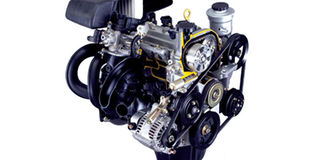Ask the Mechanic

What you need to know:
A slightly bigger 1.8 litre engine may prove to be more efficient when driving in performance demanding situations such as the highway
Which petrol engine is more efficient, 1.5L or 1.8L?
Hello Paul, I am looking to buy a car but I do not know which engine between 1.5cc or a 1.8cc is more efficient. I am looking at the Toyota ISIS 1.8cc, Honda Airwave 1.5cc and Rumion 1.5cc.
Francis
Hello Francis, the choice of engine size is usually driven by fuel economy, performance needs or purpose of the vehicle. In this case, you seem to be looking for a fuel sipping engine with reasonable performance, a measure of efficiency. Ordinarily, the smaller 1.5litre petrol engine should give you a superior fuel economy of about 16-18 kilometre per litre while the bigger 1.8litre engine will give you about 14-16 kilometre per litre.
However, these statistics are subject to how you drive (habits, aggressiveness), engine maintenance and engine efficiency improving technology, size and shape of the car, terrain and use of efficiency improving fuel.
How you drive matters. On the highway, when you drive fast to maintain speed, the smaller 1.5 litre engine will work harder and its fuel economy will drop significantly as its rev curves operate in the higher fuel thirstier rev bands. The 1.5 litre petrol engine fuel economy may drop down below 16 kilometres per litre if pushed hard on the highway. So, driving a small engine in itself is not a guarantee to superior fuel economy.
A slightly bigger 1.8 litre engine may prove to be more efficient when driving in performance demanding situations such as the highway because it is able to attain momentum and provide good performance at lower rev bands which convert into lower fuel economy. Equally, smaller petrol engines will give you superior fuel economy in the city or peri-urban traffic. This is because the performance demand is moderate, which balances well with fuel economy demands. Engine maintenance and efficiency improving technology. The engine service condition of the lubrication, ignition and air intake systems affects engine efficiency (fuel economy and performance).
Some modern engines and transmissions are designed with efficiency improving technology such as direct four (D4) fuel injection, Variable Valve Timing intelligent (VVTi) and turbo charging. These engines have improved fuel economy, often better than smaller engines without the technology.
Size and shape (design) and purpose of car can affect its efficiency. For instance, the bulkier, boxy 1.5 litre Toyota Rumion will provide the same fuel economy figures as the bigger but more aerodynamic 1.8 litre Toyota ISIS on the highway because of efficiency-sapping wind resistance. A fully loaded eight-seater 1.5 litre Honda Airwave may have the same fuel economy as the 1.8litre Toyota ISIS with four passengers on the highway or hilly terrain.
Use of efficiency improving fuels. Fuels designed with efficiency (performance and economy) improving additives and technology can be game changers in fuel economy statistics regardless of engine size. I have participated in fuel saving races using more efficient fuels and seen 1.8 litre Toyota cars achieve better than stated fuel economy of 18km/litre while 1.5 litre engines posted 19-20km/litre. Of course, efficient fuels were combined with good driving habits and engine service condition.

When I try to stop, my steering wheel shakes
Hello Paul, I drive a Toyota Corona Premio ZZT240 and while driving at speeds exceeding 60km/hr and I brake, the vehicle, especially the steering wheel shakes vigorously. What could be the problem?
Rodney
Hello Rodney, the steering judder or shaking may be caused by unevenly worn out brake discs or rotors and extremely worn out or loose suspension and steering linkage components. Brake disc rotors wear out due to age or the use of cheap counterfeit brake pads which are made of poor quality materials that damage the disc as you drive.
Uneven damage of the disc rotor surface due to intermittent thinning or warping around the rotor surface can cause juddering of brake pads when you apply the brakes at speeds of 50kph or more. The effect of this judder may be transmitted from the brake discs to the steering through the steering linkage or rack assembly. Get a good mechanic to inspect the condition of your brake disc rotors and confirm which may be the culprits.
Front suspension components such as ball joints, suspension plate bushes and upper control arms help to harness the wheel hub and axle to the car frame. When you brake a fast moving car, the dynamic forces will not be dampened by the damaged suspension parts. This may result in violent vibrations, which may feel like a judder transmitted to the steering. The mechanic should inspect your front suspension components to confirm they are all intact.

Where can I get my car fixed?
Hello Paul, my Ford Escape station wagon 2009 showed a check engine light. A mechanic said the computer diagnosis code B1353 revealed that I restarted the car when it was already in motion or I had hit a hump. Kindly recommend a good Ford /Mazda garage.
Maureen
Hello Maureen, the Ford diagnostic code B1353 reads ignition key-in circuit open. This fault causes the check engine light on your dashboard to show.
Possible causes of this fault include a faulty or damaged ignition key in switch, a shorted or open ignition key in harness or poor connection and a damaged smart junction box (SJB).
The ‘ignition key in’ feature works with the SJB to monitor and alert you with a chime if your car door is ajar or gear out of parking when the key is in ignition. Any good car electrician can fix this problem.
Try the appointed Ford dealers in Uganda who should help you.




